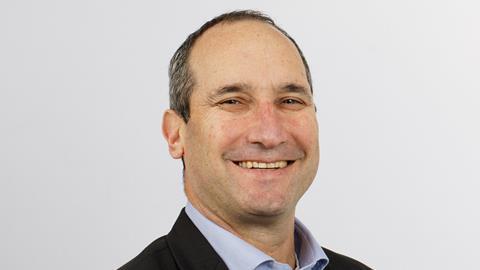Saul Resnick, chief executive of DHL Supply Chain UK and Ireland, insists that although the industry’s journey to net zero needs a clearer road map, he’s never felt more positive about his company’s future
Q: How’s business?
A: Some sectors are going at better rates than others. There’s still a lot of nervousness in the market. Consumer confidence isn’t where we would hope but we saw signs of some economic growth in the last quarter which is encouraging. If interest rates continue to fall that will continue to boost the economy and confidence. It’s a tough market nonetheless with a number of high street liquidations towards the end of last year which have impacted us. We also have some challenges in the manufacturing sector which are being felt in a few spaces. On balance, it’s pretty neutral but tending positive in the near future. We’re optimistic, we’re seeing strong signs in a few sectors.
Q: Which sectors are performing best?
A: We’re seeing good indications in healthcare. We’re picking up business from a consumer and convenience perspective as well. The convenience side has been quite resilient and there are some encouraging signs of a bounce-back in the consumer sector. Retail is challenging from a grocery point of view but our e-com business and share of market is growing at a good rate which is encouraging.
Q: Are you optimistic for the future of the industry in the longer term?
A: I’ve been here three years after coming from Australia. I haven’t felt more positive and confident than I do right now, particularly about our own business. We’re seeing a lot of opportunities, a lot of pipeline, we’re seeing more customer engagement than ever before. We’re not focused on the internal machinations of buying other companies, we’re very much focused on our customers and how we can deliver value to them.
Q: The decision to raise National Insurance and the Minimum Wage has been met with strong criticism from the business community. How much impact might it have, and how much confidence do you have in the government more generally?
A: I just came away from another session with the business secretary, Jonathan Reynolds, and they’re as engaged with business as I’ve ever experienced a government to be. They’re trying to take our feedback on board. Yes, the implications of NIC and the Minimum Wage are a concern and there will be some inflationary impact. Nonetheless it’s been in the making for some period of time and people know about it.
Overall the government are trying to do the right things. It’s still early days and I think we’ve got to give them a chance to show they’re as business friendly as they say they are, but the early indications are positive. We’re not driving the direction that they’ll travel but we’re having input. We want to be heard and feel that we’re part of the solution and from that perspective I’m encouraged.
Q: We’re now only 10 years away from the government banning the sale of diesel trucks below 26 tonnes. Can the industry meet that deadline?
A: Their objectives are no different to ours and we’re not going to get to the end game in one movement. We have to use steps to get there and alternative fuels and things like HVO, LNG and CNG are helping us towards where we want to go.
We’re working with the government to help them understand the challenges industry faces. A lot of the technology out there is very expensive and we do lack credible charging infrastructure at this time. So it’s about supporting the technologies but we won’t get to where we want to get to unless we have the right national infrastructure. That’s where a lot more focus needs to be and we’ll help government recognise the challenges the industry faces.
Q: Will the government end up having to review the current deadline on diesel truck sales?
A: There is a realistic possibility that the diesel phase-out date will be pushed back. Hopefully more plans will be revealed soon that give us a clear line of sight on whether we’ll have that infrastructure. You’re not going to go from 0-1000 overnight but let’s see a plan to go to 100. Perhaps we can avoid delays because this government is very focused on net zero emission targets so I expect they’ll be pulling out all the stops to make sure that capacity is available to industries to enable us to help them meet their objectives and our objectives as organisations.
Q: DHL’s approach so far has been more focused on HVO and gas, together with a few electric trucks….
A: Yes, we’ve got a hybrid approach, it’s not one size fits all. We know what the end game looks like but there are not enough battery electric vehicles available with long-range capability to meet our entire requirements. More so than that, we don’t have the charging facilities. If we did we would have a fully electric fleet. We’ve got HVO, LNG and CNG and it will get us a long way towards zero emissions.
What we like about HVO is you can use the existing diesel infrastructure and it gives us north of 70% carbon reduction. Hydrogen truck decarbonisation figures are also encouraging but the trucks are not available to us today. We’re not going to wait for a panacea, we’re going to work in other directions until we get to where we want to get to. Hydrogen could be the ultimate end game but at the moment it’s not available to us so what else can we do?
Q: Operators tell us their customers seem unwilling to help fund the transition, despite highlighting their green credentials at every turn…
A: If you’re a user, a manufacturer, a shipper, you’re more likely to get the supply you need from companies like DHL that can obviously support that at scale than small and medium transport hauliers that won’t necessarily have access to the supply, or won’t be able to make the commitment to the supply. We’ve been on this journey since 2007 so we’re ahead of the curve compared to some companies. Organisations want someone who can do something for them now rather than going and creating that environment for their suppliers.
Q: What would be your advice to smaller operators over decarbonisation?
A: I would advocate a two-fold approach, which is to engage alternative fuels in the interim so you’re not highly reliant on diesel. We’ve done it with HVO, CNG and LNG, whilst the government invests in the right infrastructure to ensure there’s sufficient capability to meet charging station requirement. That’s not the charging station unit itself, which private enterprise can engage in, but it’s the main infrastructure to get access to provide power into those charging facilities.
That’s the critical piece of work for the government. They know where they want to get to but we need to see a clear road map of how that will happen and by when. The industry can then plan accordingly. If we know that hypothetically in 2030 we’ll have 3-4,000% more infrastructure available around the country then that will get our thinking right about how we get from diesel to electric. And that there’s sufficient supply to meet that demand.
Q: With so many operators going under, are we likely to see more industry consolidation going forward? Will the big companies get bigger while many SMEs look to bail out?
A: There is no market that I’m aware of globally that is more competitive from a supply chain perspective than the UK. Consumers and shippers have much more choice here than anywhere else. Having said that, if you’re a supplier of logistics services, like we are, and all you’re doing is relying on price then it’s a race to the bottom and ultimately you won’t be able to differentiate yourself. So our focus is on differentiation from service and the additional value we add - whether that be environmental, technological, AI, or a whole range of other services. That may well be suited to larger companies but being a large company doesn’t mean that you’re exempt from having to add additional value.
We do see competitors of ours winning business and competing on more of a price basis but that’s not a long-term strategy because our customers are very discerning. They’re asking for more. The price is one thing but it’s about continuous improvement. They’re asking what we’re doing about automation, and what we’re doing about investing capital. That may lead to some form of consolidation but I don’t think consolidation in itself will provide the solutions. There will always be space for unique service operators or new service providers who offer value and quality of service. And let’s not forget if 3PL operators cannot provide additional services, with a value-add, companies can always in-source a lot of their activity, and that still happens. That’s probably the biggest opportunity for supply chain organisations.
Q: Some industry commentators suggest the current market presents a massive opportunity for big European players to wade in?
A: The geographic nature of the UK is attractive from a supply chain point of view. It’s a relatively small country. Having said that it’s a highly competitive market and pricing is lower and returns are tight. So we welcome competition but they’ll have to demonstrate value and quality and they’ll have to make a significant investment to do that. We’ve done that. We have more than 40,000 people working here and have a lot of capability and that gives customers a lot of confidence and security.



















